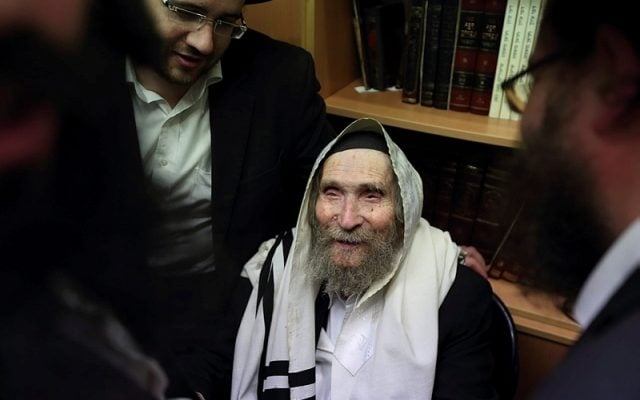Israel and the Jewish world mourn the loss of one of its greatest Torah scholars and leaders. Tens of thousands will attend his funeral Tuesday.
By: Andrew Friedman/TPS
Rabbi Aharon Yehudah Leib Shteinman, the head of the Ponevezh Yeshiva in Bnei Brak and the head of the Degel HaTorah political party’s Council of Torah Sages, died Tuesday morning. He was 104.
Shteinman was born in Brisk, then part of the Russian Empire (now Belarus), and was educated at the illustrious Imre Moshe and Kletzk yeshivas. He fled his home during the 1930s in order to avoid being drafted into the Polish army, eventually making his way to Switzerland, where he was interned at the Schonenberg labor camp, where he spent the duration of the Holocaust. Following the war, he immigrated to Israel and spent the rest of his life in Bnei Brak.
President Reuven Rivlin eulogised the rabbi as a “Torah giant” and a leader who gave direction and inspiration to tens of thousands of people. Rivlin also praised Shteinman for staunchly defending his beliefs while also maintaining the ability to put his points across with a pleasant demeanor, with a sense of love for all Jews.
“The last time I met him I was treated to a special spark of the glorious Jewish history of Lithuania. The rabbi was tremendously dedicated to Torah study, he was a phenomenal scholar with a sharp eye and a good heart. He was rich with life’s experience, whose scholarship was exceeded only by his personal humility.
“His death leaves me with a deep feeling of loss. May his memory be blessed,” Rivlin said.
Opposition Leader MK Yitzhak Herzog also emphasized the rabbi’s modesty and spiritual power, and said his impact on haredi Judaism would continue to be felt for generations.
“Teaching Torah and imparting values for future generations was the center of his world-view. That brought about many revolutions for the world of Torah students,” Herzog said.
Inside the haredi world Shteinman was known for the depth and breadth of his scholarship, as well as for his uncompromising defence of Haredi values and political and educational independence from the State of Israel. He authored more than two dozen commentaries on the Torah and Talmud and was considered one of the leading halachic (Jewish law) authorities of his generation.
At the same time, however, the rabbi was also considered a pragmatist who maintained a keen eye for the needs of both individuals and the wider community. Although in public, Shteinman remained strongly opposed to ultra-Orthodox youth serving in the IDF and committed to the community gospel of forgoing work in order to dedicate one’s life to the study of Torah, the rabbi’s tacit acceptance was critical for the success of IDF programs such as Netzah Yehuda and Shachar, as well as for academic study programs for haredi men and women who wanted to learn professions.
That sense of pragmatism also led to clashes within the ultra-Orthodox world, most recently with followers of Jerusalem-based Rabbi Shmuel Auerbach: whereas Shteinman instructed followers to appear at IDF induction centers in order to formally be exempted from mandatory military service, Auerbach’s followers refuse even that level of recognition of the jurisdiction of the Israeli state.
Opposition leader Herzog noted that point. “His crystal-clear view favored dialogue and trying to forge agreements. How fortunate he was to raise up so many generations of Torah scholars,” Herzog said.
Rabbi Shteinman will be laid to rest on Tuesday in Bnei Brak. Hundreds of thousands are expected to attend.





